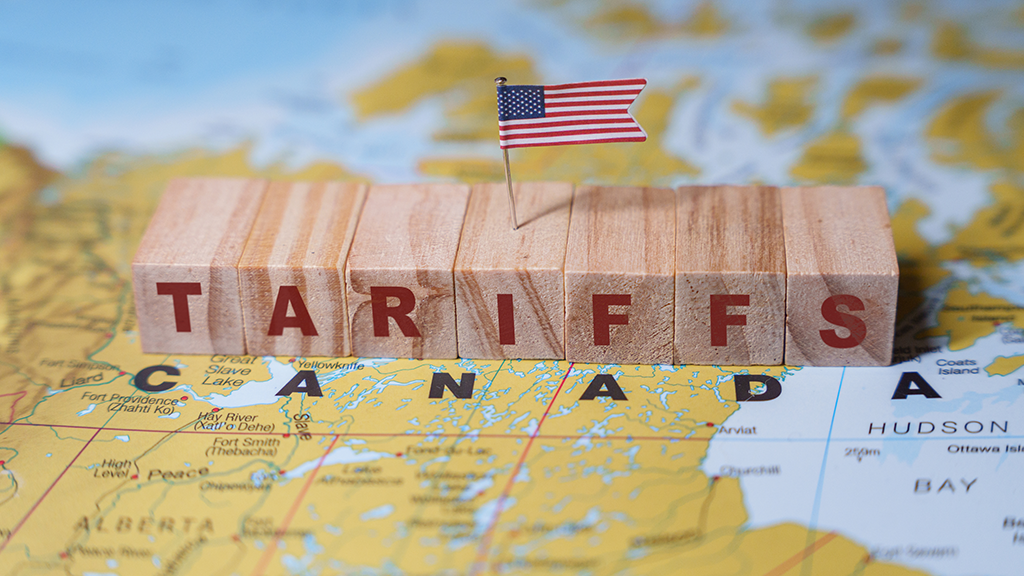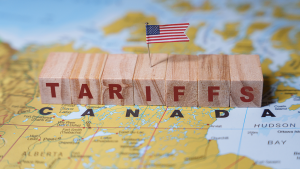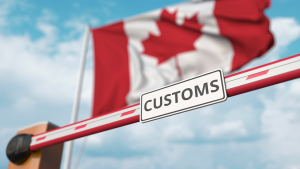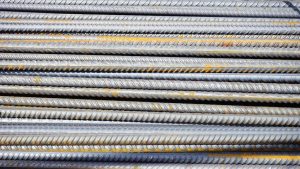U.S. President Donald Trump’s on-again, off-again tariffs, and the cloud of uncertainty they’ve cast over economies around the globe, will have implications for Canada’s construction industry and could affect language in future contracts, according to senior lawyers at Dentons Canada LLP in Toronto.
Karen Groulx, a partner, and Dragana Cerovina, a senior associate at the firm, note there are several items on Canada’s retaliatory tariff list that are regularly imported for use in construction. The two recently posted an article on Dentons website that dealt with the issue.
Some of those items include sheet piling made of iron or steel, structural steel components such as beams, columns and frames, aluminum pipes and tubes, cabinet hardware fittings and window fixtures. Prefabricated buildings, frames, doors and windows are also subject to tariffs.
“Construction, in particular, is affected,” says Groulx. “Everything from large infrastructure projects to the small ones are affected. It’s going to affect everybody because the list of products is ever-changing. They’re all, for the most part, commodities in all different types of projects.”
Because tariffs affect steel and aluminum products used in building, the cost of items like nuts and bolts will likely rise, and there could be supply chain risks which will lead to project delays.
Apart from the hard costs, though, there are other issues due to tariffs. Owners and contractors will have to assess how the uncertainty and impacts arising from the levies can be addressed.
Groulx says force majeure clauses in a contract are unlikely to excuse parties from contractual obligations, which means they likely won’t be able to seek an increase in a contract price to cover increases due to tariffs, because Trump was clear about imposing them.
Force majeure is a clause included in contracts to remove liability for unforeseeable catastrophes interrupting a project timeline and preventing participants from fulfilling obligations.
A force majeure clause is most often to cover events like war, nuclear contamination, pressure waves or discovery of species at risk, says Groulx.
“That’s not going to help you, right?”
The question, then, is whether current construction contracts include terms that provide for cost increases arising from tariffs to be passed along to the owners. Contracts commonly used in the industry – namely those known as CCDC2 2020 and CCDC5B 2010 – provide a mechanism by which increased costs arising from tariffs may be passed along to owners.
CCDC5B 2010 stipulates the construction manager shall pay all customs, taxes and duties in effect during the performance of the work and the amount incurred shall be included in the cost of work.
Similarly, a CCDC2 2020 stipulated price contract provides that the price shall include all taxes and customs duties in effect at the time of bid closing, except value added taxes payable by the owner to the contractor, but any increase or decrease in costs to the contractor due to changes in taxes and duties after the bid closing shall increase or decrease the contract price accordingly.
Groulx says an owner might be under the impression if they have a fixed-price contract or a force majeure clause they are protected but that’s often not the case unless there’s a specific provision in a contract that addresses tariff hikes.
If contractors find themselves in a bind due to material hikes caused by tariffs and they do not have provisions in their deals, Groulx says they should consider whether there are other clauses that might allow them to pass along the cost increases. Or they could ask suppliers to renegotiate in hopes of getting a break on the current contract or a deal on a future arrangement.
“Sometimes you will get an owner who says, ‘Go pound salt,’ and then there may be other ways to get around it,” she says. “You often hear, ‘let’s horse trade,’ where the contractor may say to the supplier, ‘OK, you might have to eat it on this one, but I’ll promise you the next one.’”
For both owners and contractors presently negotiating a contract, they should ensure they have the right language in place to address situations like possible tariff increases, advises Groulx.
Another issue is that contracts often don’t deal with problems that stem from sourcing supplies – which could become more prevalent due to tariffs – so parties may want to consider specific language in deals that would lower costs by allowing materials to be sourced locally, she says.
Alternately, contractors may want to set aside funds in their contingency budget or note that their bid is based on the assumption that costs won’t be impacted by imposition of tariffs, adds Groulx.
Wild fluctuations in monetary exchange rates is another issue that has arisen as a result of tariff ambiguity, as it can lead to higher costs for materials.
“That is something that the contractor has to price and that’s something they have to build into their contingency,” Groulx notes. “They can’t go to the owner and say, ‘Well geez, I didn’t think of that.’”











Recent Comments
comments for this post are closed